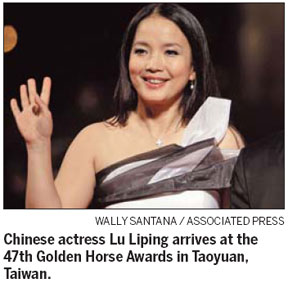

Local works and filmmakers swept the 47th Golden Horse Awards, known in the Chinese-language world as the Academy Awards.
The biggest winner of the award ceremony held in Taoyuan, Taiwan, on Saturday night, was local director Chang Tso-chi, whose family drama When Love Comes won four top honors, including the Best Film award.
The low budget film about two women's lives beat Hong Kong action blockbuster Bodyguards and Assassins, and Judge, a legal drama by mainland filmmaker Liu Jie.
Another top honor, the Best Director award, went to Taiwan director Chung Mong-hong for The Fourth Portrait, about an abandoned child using paintings to express his inner world.
The biggest surprises were the two top awards in the acting categories.

Mainland veteran Lu Liping, who plays a working class mother in City Monkey, a film on parkour, defeated the big favorite Xu Fan, the mother who felt guilty about making a choice of which child to save in Aftershock, the record-grossing Chinese film .
Zhang Yuan, mainland director and member of the jury, explained why Lu got the award in a Sina.com interview.
"City Monkey was a lame film, but Lu still gives an impressive performance," he said. "Besides, I think Xu performed brilliantly in Aftershock, but most Taiwan judges did not like the film, and they made up the majority of the jury."
Mainland actress Tang Wei, who rose to fame by acting in Ang Lee's spy thriller Lust, Caution and became a hot topic when blacklisted by the authorities for her nude scenes, was nominated for the award, too.
Taiwan actor Ethan Ruan was another big surprise, winning the Best Actor award by playing a hooligan in Monga, a gangster film set in 1980s Taiwan.
The heartthrob has built a name for himself among mainland and Taiwan audiences in several romantic TV series and Monga was his screen debut.
Zhang Yuan quoted other judges as saying that Ruan won the honor because he had demonstrated mature acting skills.
Other nominees for the award included veterans such as Wang Xueqi, who plays a loving father in Bodyguards and Assassins, and Ni Dahong, who led in Judge. Qin Hao, in Spring Fever, a film about gay romance, was another contender.
Qin's fellow mainland actress Hao Lei won the Best Supporting Actress award with The Fourth Portrait.
The technological awards were scattered among several box office triumphs, such as Ip Man 2 and Bodyguards and Assassins.
While the Hong Kong Film Awards puts more emphasis on films with commercial success and the mainland Golden Rooster Film Festival praises those with politically correct values, the Golden Horse has built a name for focusing on artistic values and support of new filmmakers - even in the late 1990s when Taiwan cinema was in severe decline.
Since the mid-1990s it has included Chinese-language films not only from Taiwan, but also those from the mainland, Hong Kong and North America. The first winner after the reform was mainland director Jiang Wen's In the Heat of the Sun, which won best film, director and actor awards in 1996.
But in recent years the organizers' efforts to support local filmmakers, especially those who stick to low-budget art house works, has been apparent.
Last year, Leon Dai's Cannot Live without You, on a father-child relationship, won four top awards including Best director and Best Film. In 2008 young director Wei Te-shen's Cape No 7 snapped up six awards.